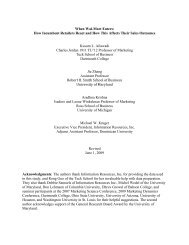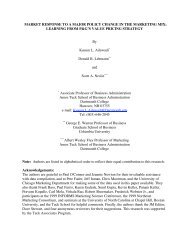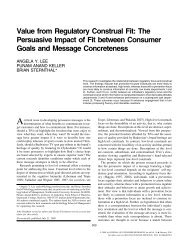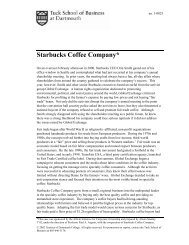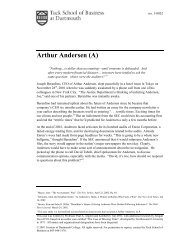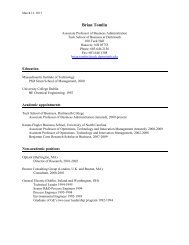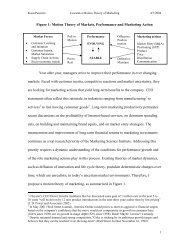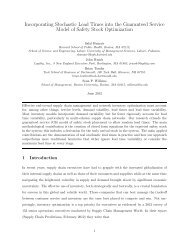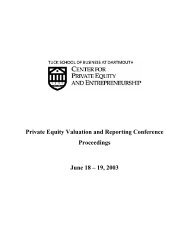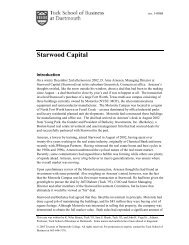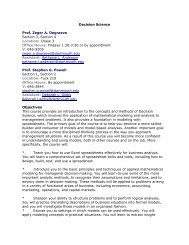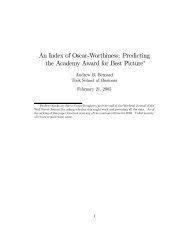tax notes international - Tuck School of Business - Dartmouth College
tax notes international - Tuck School of Business - Dartmouth College
tax notes international - Tuck School of Business - Dartmouth College
You also want an ePaper? Increase the reach of your titles
YUMPU automatically turns print PDFs into web optimized ePapers that Google loves.
and unable to pay their <strong>tax</strong> bills to spread payment <strong>of</strong><br />
their bills over a timetable they can afford.’’ All <strong>tax</strong>es<br />
paid by businesses are covered: corporation <strong>tax</strong>, income<br />
<strong>tax</strong>, value added <strong>tax</strong> on sales, income <strong>tax</strong> deducted<br />
from the wages and salaries <strong>of</strong> employees, and<br />
national insurance contributions. This is a nonstatutory<br />
measure and therefore will not feature in the forthcoming<br />
Finance Bill. It also means that if the Revenue do<br />
not agree to a postponement, there is no right <strong>of</strong> appeal.<br />
When it was first announced, some business proprietors<br />
thought that it meant they were free to pay their<br />
<strong>tax</strong>es when they wanted. Instead, it is a matter <strong>of</strong> negotiating<br />
with someone in the BPSS a planned program<br />
<strong>of</strong> payments for liabilities becoming due. It is not<br />
an option open to all — only trading companies, sole<br />
traders, and partnerships. The Revenue have set out<br />
three conditions: The business must be in genuine difficulty,<br />
unable to pay the <strong>tax</strong> on time, and likely to be<br />
able to pay if it was allowed more time.<br />
The real practical help for<br />
these times has taken the<br />
form not <strong>of</strong> rate cuts, but<br />
<strong>of</strong> allowing businesses to<br />
spread their <strong>tax</strong> payments<br />
over an agreed period.<br />
I have no experience <strong>of</strong>, nor have I heard <strong>of</strong>, any<br />
anecdotal evidence <strong>of</strong> how this facility is working. According<br />
to a January 14 press release, the Revenue state<br />
that over 20,000 businesses had been allowed to defer<br />
more than £350 million <strong>of</strong> <strong>tax</strong>es, which sounds impressive,<br />
but averages out at only £1,750 each. The press<br />
statement also claims that, in the majority <strong>of</strong> cases, it<br />
can take the Revenue as little as 10 minutes to reach a<br />
decision, although we are not told what that decision<br />
is.<br />
For sole traders and partners, any income <strong>tax</strong> that<br />
remains unpaid 28 days after the due date attracts a 5<br />
percent late payment surcharge and a further 5 percent<br />
if it is still unpaid six months later. If a deferment plan<br />
is agreed on, there is no surcharge imposed for late<br />
payment. However, there is, <strong>of</strong> course, a price to pay,<br />
and that is in the form <strong>of</strong> interest, currently 4.5 percent<br />
(in other words, 3 percentage points above base rate).<br />
When I had a real job and was running my own<br />
practice on overdraft, I was being charged 2.5 percentage<br />
points above my bank’s own base rate. This would<br />
currently mean a rate <strong>of</strong> 4 percent; so the rate charged<br />
by the Revenue is not too bad, at least at first sight. It<br />
is easy to overlook the fact that interest charged on late<br />
FEATURED PERSPECTIVES<br />
payment <strong>of</strong> <strong>tax</strong> is not itself <strong>tax</strong> deductible. Depending<br />
on the rate and type <strong>of</strong> <strong>tax</strong> being paid, it is an effective<br />
gross rate <strong>of</strong> between 5.62 percent to 7.5 percent. So a<br />
business with cash flow problems would be better using<br />
its existing overdraft facilities if possible.<br />
The problem is, <strong>of</strong> course, that many will probably<br />
be at the limits <strong>of</strong> their permitted borrowings, and<br />
therefore agreeing on a deferral plan with the Revenue<br />
may be the only way out. Certainly it is much more<br />
advisable than for the business proprietor to seek a personal<br />
unsecured loan, which can carry interest <strong>of</strong> at<br />
least 8 percent, which again would not be <strong>tax</strong> deductible<br />
(or, for that matter, to stick his head in the sand<br />
and hope the problem goes away).<br />
Although 200,000 businesses were said to have<br />
made use <strong>of</strong> this deferral option, I expect there will be<br />
many more applications in the next couple <strong>of</strong> weeks.<br />
Most companies in the U.K. tend to have a March 31<br />
or December 31 year-end, and as the corporation <strong>tax</strong><br />
<strong>of</strong> small and medium-size companies is due nine<br />
months after the year-end, many will have had to pay<br />
the <strong>tax</strong> on October 1, 2008, for the year to March 31,<br />
2008, or on January 1, 2009, for the year to March 31,<br />
2008. Possibly the majority <strong>of</strong> the 200,000 businesses<br />
referred to in the Revenue’s press release are in that<br />
category. The next category to apply for deferment will<br />
be the sole traders and partnerships. Their <strong>tax</strong> liabilities<br />
are not as straightforward as companies.<br />
To begin with, they are charged <strong>tax</strong> for a <strong>tax</strong> year,<br />
not for the period for which they prepare their accounts.<br />
The amount charged for an ongoing business<br />
for the <strong>tax</strong> year 2007-2008, for example, will be the<br />
<strong>tax</strong>-adjusted pr<strong>of</strong>its <strong>of</strong> its accounting period ending in<br />
that <strong>tax</strong> year. As sole traders and partnerships are free<br />
to choose whatever accounting date they wish, those<br />
pr<strong>of</strong>its may have been earned as long ago as the year<br />
to April 30, 2007, in the days when the word<br />
‘‘subprime’’ had not entered into common parlance<br />
and most people thought Northern Rock was a popular<br />
dance. Income <strong>tax</strong> for 2007-2008 is payable by two<br />
amounts, each being half <strong>of</strong> the final liability for the<br />
<strong>tax</strong> year 2006-2007, due on January 31, 2008, and July<br />
31, 2008, and a final ‘‘catch-up’’ payment on January<br />
31, 2009, if the actual liability for the year turns out to<br />
be more than that for the previous year, as it should do<br />
if the business is growing.<br />
Although a prudent small-business proprietor who<br />
had made good pr<strong>of</strong>its in the year to April 30, 2007,<br />
will make sure he has the cash available to pay the <strong>tax</strong><br />
when it comes due, life is not like that. Most business<br />
proprietors pay last year’s <strong>tax</strong> out <strong>of</strong> this year’s income.<br />
The problem is that there may not be any income<br />
this year. On January 31, 2009, the proprietor is<br />
therefore faced with having to pay a large <strong>tax</strong> bill on<br />
income earned in the year ended April 30, 2007, which<br />
has been spent when there’s nothing in the kitty this<br />
year to pay it. But that’s not all — on that same date<br />
TAX NOTES INTERNATIONAL FEBRUARY 2, 2009 • 413<br />
(C) Tax Analysts 2009. All rights reserved. Tax Analysts does not claim copyright in any public domain or third party content.



